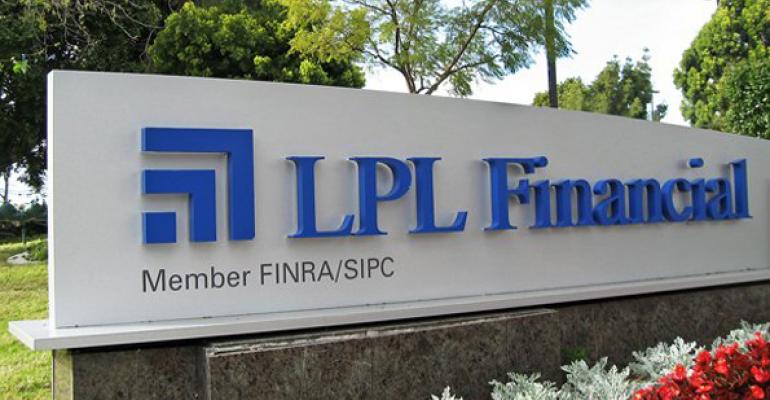Equity research analysts following LPL Financial said they were surprised by the Reuters report that the nation's largest independent broker/dealer is exploring a sale given the uncertain environment for independent b/ds coming under compliance burdens related to regulations like the Department of Labor’s fiduciary rule. While that rule could be the catalyst for current shareholders to look to sell the firm, it could also turn off potential buyers. If the firm were to find a buyer, it would most likely be a wirehouse or larger national brokerage, despite those firms different business models, these analysts say.
“Ironically [the DOL rule] may have motivated the conversation to say, ‘Hey, do we really want to deal with this? Well, let’s hire someone to see if they can find a buyer,’” said Douglas Mewhirter, an equity analyst at SunTrust Robinson Humphrey.
“Of course the buyer might say, ‘Do we really want to deal with this?’”
Mewhirter estimates that a strategic buyer would pay close to $40 a share; the company’s shares are currently trading at about $33.
“There’s value here for the right buyer,” he said, in an interview with WealthManagement.com. “But it’s not a foregone conclusion. There are definitely obstacles and hurdles in the way that have to be resolved.”
One of those is the DOL rule, which would affect LPL’s commission-based business, which accounts for about 40 percent of the firm's overall revenue.
And a buyer would also have to deal with LPL’s large amount of financial leverage; the firm already has $2 billion in debt, Mewhirter said.
“If a bank were to buy LPL, that extra debt may affect their capital ratios,” he said.
“If a pure financial buyer were to buy LPL, it would be hard to add more debt, (but that's) usually what they do. They do leveraged buyouts; they leverage up the purchase to get that extra return.”
Steven Chubak, equity analyst with Nomura, believes there are too many hurdles to overcome—including the DOL rule, LPL’s large negative tangible common equity and debt covenant—such that a deal is unlikely to be completed.
“Further, any potential acquirer would have to be comfortable taking on the litigation/earnings risk that will arise from the best interest contract exemption, which, with 30 percent of LPLA’s current AUM in brokerage retirement accounts, is material,” Chubak wrote in an analyst note.
Devin Ryan, an analyst with JMP Securities, said in an analyst note that he was surprised by the timing of the news, given industry uncertainty around the DOL rule. He would expect a buyer to underwrite the IBD’s forward earnings potential, due to the DOL uncertainty. He does not believe the news is related to any undisclosed issues with litigation, expenses or other business headwinds.
The firm’s stock is down 23 percent year-to-date, “which we suspect has raised pressure to create value, and could potentially help explain the timing as we would not characterize the current backdrop as particularly favorable to sell into,” Ryan said.
The most logical buyer, Ryan writes, would be a retail b/d with a largely employee-based advisory force, such as Morgan Stanley, Wells Fargo, Merrill Lynch, Edward Jones, Raymond James or Stifel Financial.
“While we believe some expense synergies could be realized, which could make an acquisition interesting, risks would include attrition potential if LPL’s independent contractors are not enthusiastic about the acquiring firm,” Ryan said.
While there could be interest from some private equity firms looking to drive synergies, such as Lightyear Capital with its Advisor Group, Ryan believes most of these buyers would want a discounted price.
SunTrust’s Mewhirter believes the wirehouses and trust banks would be the natural strategic buyers. “A wirehouse has the necessary scale to absorb the compliance costs, while a trust bank could gain scale in its custody business,” he wrote in an analyst note.
Wells Fargo would likely be at the top of the list of wirehouses; its independent b/d business (FiNet) has a similar business model to LPL’s and could benefit from back-office synergies, he said.
The Bank of New York Mellon, which owns Pershing, would also be a logical choice, as the firm could add $196 billion of advisory assets under management to its custody platform.
“I don’t think [advisors] should fear that for some reason it’s going to make their business crumble because there’s some sort of uncertainty," Mewhirter said. "They basically hang out their own shingle anyway.”
LPL declined to comment.





